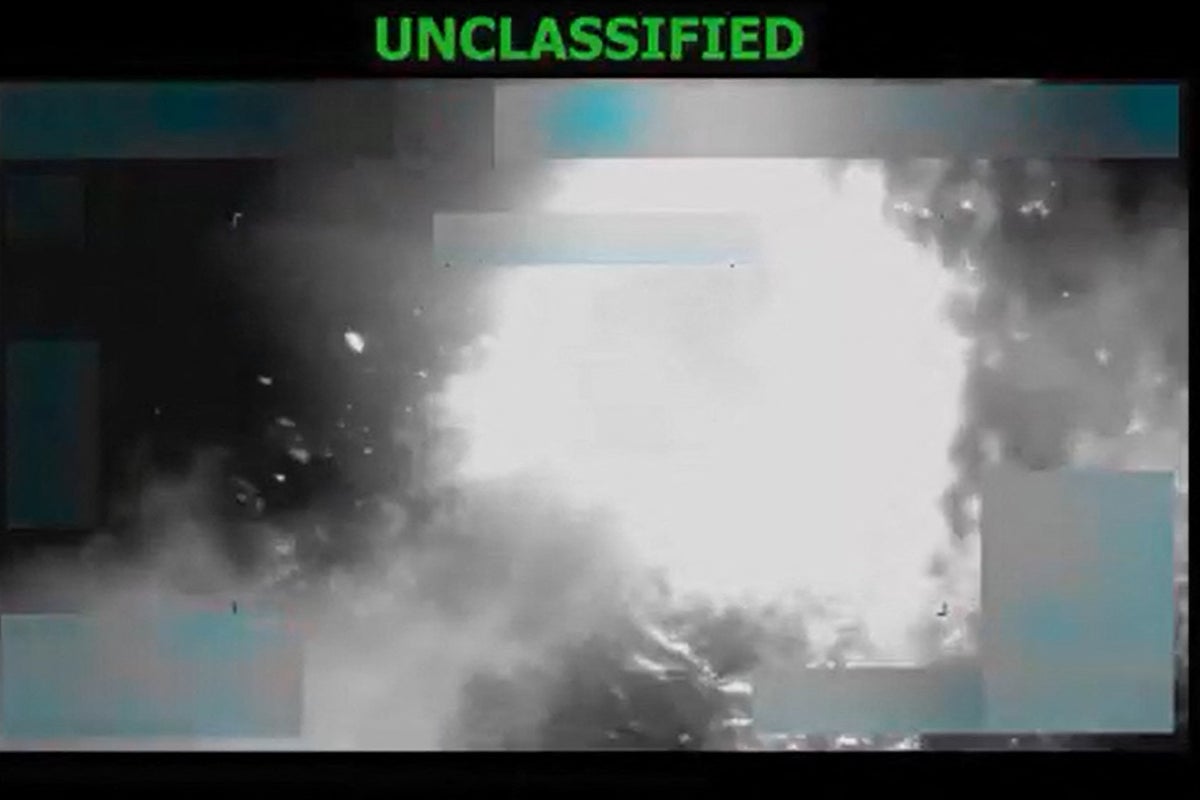
A newly unveiled legal memo from Donald Trump’s Department of Justice claims military personnel involved in a series of lethal strikes against alleged drug runners won’t face criminal prosecution in the future.
But conflict experts tell The Independent that the “just following orders” defense may not stick under other administrations or federal judges who could find the strikes illegal, exposing Pentagon officials and others to criminal liability.
“The term for premeditated killing outside of armed conflict is murder,” said Brian Finucane, senior adviser with the International Crisis Group, a conflict policy nonprofit.
“And the Trump administration has not established that these strikes are taking place in an armed conflict nor that the targets would be lawful under the law of war,” he told The Independent.
While it’s not clear what instructions the Justice Department’s Office of Legal Counsel have provided the administration, the White House appears to be using that guidance as a “legal permission slip to commit acts that might otherwise be criminal,” according to Finucane.
The Independent has requested comment from the Justice Department.
As of this publishing, the Trump administration has directed more than a dozen strikes that have killed at least 75 people on vessels in the Caribbean and Pacific Ocean that officials claim are shipping drugs into the United States from Latin America.
In September, the administration told Congress that the United States is formally engaged in an “armed conflict” with drug cartels that the president has labeled “unlawful combatants.”
Administration officials have labeled cartels “nonstate armed groups” whose actions “constitute an armed attack against the United States” and are now engaged in a “noninternational armed conflict” — or war with a non-state actor.
Critics, including members of Congress and the United Nations, have argued that the Trump administration’s air campaign amounts to illegal extrajudicial killings, and lawmakers and civil rights groups are pressing the administration for any evidence or legal arguments to justify the attacks.
“‘They can’t be prosecuted because we say they can’t,’ or ‘it’s legal because we say it is’ is obviously not enough of a justification, and we don’t have a view into what convoluted lawyering they’re doing — if any — to come to this conclusion,” according to Adam Isacson, director for defense oversight at the Washington Office on Latin America research and advocacy group.
“Either way, military personnel would only be covered during the current administration; a future [Office of Legal Counsel] or a federal judge could (and in my view, should) find that this practice is illegal,” he told The Independent.
“I don’t see how anyone could be shielded from prosecution if the [Office of Legal Counsel] opinion gets voided in the future, especially if its text doesn’t even come up with plausible reasons why the personnel might deserve to be shielded,” he said.
This week, the U.K. and Colombia ended regional intelligence sharing with the United States, with Colombian President Gustavo Petro urging that “the fight against drugs must be subordinated to the human rights of the Caribbean people.”
Asked why he won’t seek permission from Congress for his military campaign taking aim at South American regimes he claims are fueling a drug epidemic in the United States, Trump said his government is “just going to kill people” instead.
“I don’t think we’re going to necessarily ask for a declaration of war. I think we’re just going to kill people that are bringing drugs into our country, OK? We’re going to kill them,” Trump said during a White House roundtable with administration officials last month.
“They’re going to be, like, dead, OK,” he said.
The world’s largest aircraft carrier, the USS Gerald R Ford, arrived in the Caribbean this week as Trump escalates a war on alleged drug traffickers.
While the U.S. military builds up a presence off the coast of Venezuela, the Trump administration is mulling potential plans for attacking the country, an operation that risks spilling over into a regional war.
Venezuela is not a major cocaine-producing country, according to the United Nations Office on Drugs and Crime (UNODC). Virtually all coca crops are inside Bolivia, Peru and Colombia, and the Drug Enforcement Administration under Trump did not mention Venezuela in a March report on the state of cocaine trafficking.
Still, the Trump administration has sought to link Venezuelan President Nicolas Maduro to the drug trade, as well as the gang Tren de Aragua, despite reports from intelligence agencies that have denied ties between the group and Maduro’s government.
